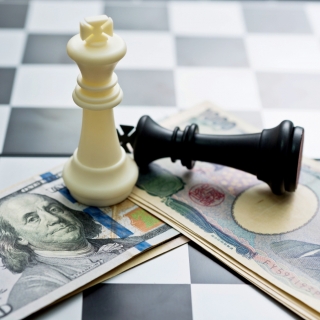


The dollar edged up from a two-week low against its major peers in holiday-thinned trading on Thursday, though the yen headed for its strongest week in nearly three months on growing bets that Japan will hike rates in December.
The yen slipped half a percent to 151.93 per dollar ,but with its 1.9% gain this week the currency has recovered losses suffered since the U.S. election. Markets see about a 65% chance the Bank of Japan will hike rates next month.
The dollar index was marginally higher at 106.30 after suffering its steepest fall in four months that pushed it as low as 105.85 in the prior session.
Broad trade was lightened due to the U.S. Thanksgiving holiday.
"It's likely to be a subdued couple of days to wrap up the week but I expect the dollar should rebound as December gets underway," said Michael Brown, senior research strategist at Pepperstone, adding that Wednesday's move that put the dollar back under 106 seemed a bit "detached from fundamentals."
"We're still talking about U.S. exceptionalism, an incredibly long laundry list of issues in the euro zone and now we've got French budget worries this morning."
The euro consolidated after its sharp rise on Wednesday following hawkish remarks from European Central Bank board member Isabel Schnabel.
She told Bloomberg that rate cuts should be gradual and move to neutral, not accommodative, territory, prompting investors to pull back on more aggressive rate cut expectations and buy the common currency.
"Not only has downward momentum faded, but upward momentum is also beginning to build," said Quek Ser Leang, strategist at UOB in Singapore.
"We view the current price action as part of a rebound that could potentially reach $1.0650."
Inflation readings due later in the session in Germany will offer the next test as the common currency heads for its worst monthly showing in two-and-a-half years. Eyes are also on France's fragile coalition government, which is struggling to pass a budget.
Sterling dipped to 1.2649 on the greenback, while the Swedish krona firmed against the dollar and euro as data showed sentiment among businesses and consumers in Sweden picked up in November.
The Australian dollar recovered from early weakness and traded flat at $0.64946 as Reserve Bank of Australia governor Michele Bullock said that core inflation was too high to allow for rate cuts in the near term.
While the currency majors were in a bit of a lull, there was some action in emerging markets.
The Mexican peso rose over 1.5% after Donald Trump said on his Truth Social platform that Mexico's president Claudia Sheinbaum had "agreed to stop migration through Mexico," an issue Trump had linked to his pledge to impose tariffs.
Sheinbaum said she had laid out Mexico's migration strategy, which is "not to close borders, but to build bridges."
South Korea's won was a little weaker too, with dealers reporting authorities had steadied it, after the central bank cut rates at a second straight meeting - an outcome only four of 38 economists polled by Reuters had foreseen.
Russia's rouble hovered near 110 per dollar after shedding nearly a third of its value since August, as the Russian central bank said it would stop forex purchases until the end of the year to support the currency.
Brazil's real collapsed to its lowest ever spot close on concern over the impact of tax cuts on a stretched budget.
Investors fortified their short positions on most emerging Asian currencies including the Singapore dollar and Indonesian rupiah on fears over Trump's tariff pledges.
Source : Reuters
The Japanese yen weakened to near 158.5 per dollar on Thursday, amid market concerns over the worsening fiscal outlook. The Bank of Japan (BOJ) began a two-day policy meeting, and traders remained war...
The USD/JPY pair weakened in Asian trading on Monday, hovering around 156.20 and briefly approaching 156.00. This weakening occurred after the Japanese Yen (JPY) strengthened, following signals from t...
The Japanese yen is the worst-performing major currency against the US dollar throughout 2025, despite the Bank of Japan (BOJ) raising interest rates. Even with further tightening measures, the yen co...
The Japanese yen weakened slightly during the Asian session on Wednesday, as investors remained cautious while awaiting the Bank of Japan (BoJ) policy update. Market focus now turns to the two-day BoJ...
The USD/JPY pair weakened to around 155.10 at the start of the Asian session on Tuesday. The yen strengthened slowly as markets became increasingly confident that the Bank of Japan (BoJ) would raise i...
Gold prices briefly caused a stir after hitting a new record, but then slowed. The main trigger: US President Donald Trump withheld the threat of tariffs on Europe and claimed there was a "framework" for a future agreement on Greenland. This calmer...
Oil prices were little changed in Asian trading on Thursday after US President Donald Trump backed down from a threat to impose tariffs on European countries over Greenland. This decision helped ease geopolitical tensions and improve market...
The Nikkei 225 Index climbed 1.73% to close at 53,689, while the broader Topix Index rose 0.74% to 3,616 on Thursday, snapping a five-day losing streak as Japanese shares were lifted by a strong rally in chip and artificial intelligence related...